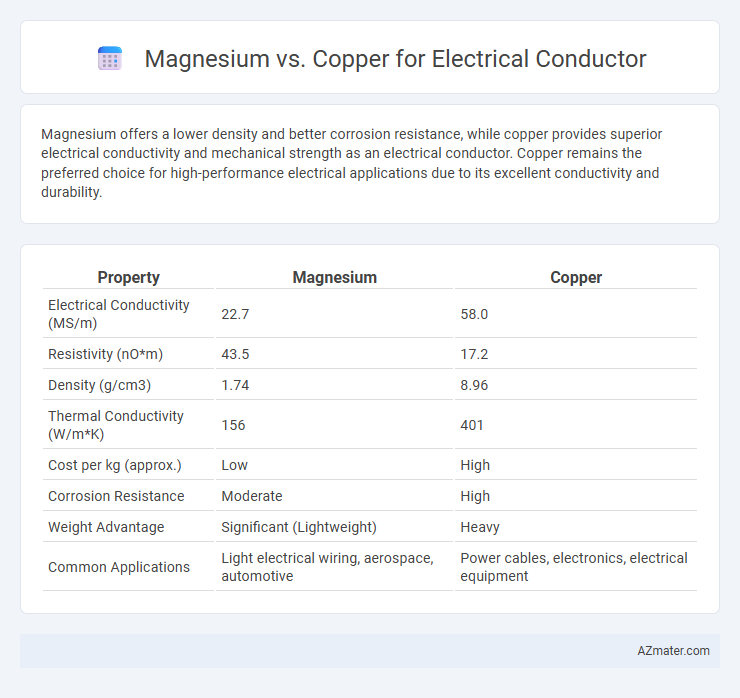Magnesium offers a lower density and better corrosion resistance, while copper provides superior electrical conductivity and mechanical strength as an electrical conductor. Copper remains the preferred choice for high-performance electrical applications due to its excellent conductivity and durability.
Table of Comparison
| Property | Magnesium | Copper |
|---|---|---|
| Electrical Conductivity (MS/m) | 22.7 | 58.0 |
| Resistivity (nO*m) | 43.5 | 17.2 |
| Density (g/cm3) | 1.74 | 8.96 |
| Thermal Conductivity (W/m*K) | 156 | 401 |
| Cost per kg (approx.) | Low | High |
| Corrosion Resistance | Moderate | High |
| Weight Advantage | Significant (Lightweight) | Heavy |
| Common Applications | Light electrical wiring, aerospace, automotive | Power cables, electronics, electrical equipment |
Introduction to Electrical Conductors
Magnesium and copper are both metals used in electrical conductors, but copper remains the preferred choice due to its superior electrical conductivity and durability. Copper has a conductivity of approximately 5.96 x 10^7 S/m, significantly higher than magnesium's conductivity of about 2.3 x 10^7 S/m, making copper more efficient in transmitting electric current. While magnesium is lighter and less expensive, copper's excellent corrosion resistance and mechanical strength ensure reliable and long-lasting electrical connections.
Overview of Magnesium as an Electrical Conductor
Magnesium exhibits a lower electrical conductivity compared to copper, with a conductivity of approximately 23% IACS (International Annealed Copper Standard), limiting its efficiency in electrical conduction applications. Despite its lighter weight and good corrosion resistance, magnesium's higher electrical resistivity and lower ductility restrict its use largely to specialized, weight-sensitive applications rather than mainstream electrical wiring. Copper remains the preferred conductor due to its superior conductivity (100% IACS), excellent mechanical properties, and proven reliability in electrical systems.
Overview of Copper as an Electrical Conductor
Copper is widely recognized for its exceptional electrical conductivity, second only to silver, making it the preferred material for electrical wiring and components. Its high thermal conductivity, corrosion resistance, and ductility ensure reliable performance in various applications, from household wiring to industrial power systems. Compared to magnesium, copper offers superior electrical efficiency and durability, justifying its prevalent use in electrical conductors.
Electrical Conductivity: Magnesium vs Copper
Copper exhibits significantly higher electrical conductivity than magnesium, making it the preferred choice for electrical conductors in power transmission and electronic applications. Copper's conductivity measures approximately 59.6 x 10^6 S/m, whereas magnesium's conductivity is considerably lower, around 23 x 10^6 S/m. This substantial difference impacts efficiency, energy loss, and thermal management, positioning copper as the superior material for reliable and efficient electrical conduction.
Mechanical Properties Comparison
Magnesium offers a lower density of approximately 1.74 g/cm3, resulting in lighter electrical conductors compared to copper's density of 8.96 g/cm3, which benefits applications where weight reduction is critical. Copper surpasses magnesium in tensile strength, typically around 210 MPa for copper versus 200 MPa for magnesium alloys, providing greater durability under mechanical stress. Despite its lower strength, magnesium exhibits better vibration dampening and flexibility, making it suitable for specific environments requiring shock absorption in electrical conductor applications.
Thermal Performance Differences
Magnesium exhibits lower thermal conductivity, around 156 W/m*K, compared to copper's superior 401 W/m*K, making copper more efficient for heat dissipation in electrical conductors. Copper's higher thermal performance allows it to maintain lower operating temperatures under heavy electrical loads, reducing the risk of overheating and extending conductor lifespan. The thermal stability and resistance to oxidation also favor copper for applications requiring consistent thermal management and enhanced electrical efficiency.
Weight Considerations in Electrical Applications
Magnesium offers a significantly lower density of approximately 1.74 g/cm3 compared to copper's density of 8.96 g/cm3, making it an ideal choice for weight-sensitive electrical applications such as aerospace and portable electronics. Despite copper's superior electrical conductivity (approximately 59.6 MS/m at 20degC), magnesium alloys provide a favorable strength-to-weight ratio, enabling efficient conductor designs with reduced overall mass. Engineers select magnesium over copper when minimizing weight is paramount, even if it requires compensating for slightly lower conductivity through conductor sizing adjustments.
Corrosion Resistance and Longevity
Magnesium exhibits lower corrosion resistance compared to copper, making copper highly preferred for electrical conductors in environments prone to moisture or oxidation. Copper's superior corrosion resistance directly enhances the longevity and reliability of electrical systems, reducing maintenance needs and extending service life. The oxide layer formed on copper surfaces acts as a protective barrier, whereas magnesium's corrosive degradation often leads to compromised conductivity and structural integrity over time.
Cost and Availability Analysis
Magnesium offers lower cost and higher abundance compared to copper, making it an attractive option for large-scale electrical conductor applications where budget constraints exist. Copper's superior electrical conductivity and widespread availability ensure it remains the preferred choice despite higher material costs. Cost analysis indicates magnesium conductors reduce initial material expenses, but copper's established supply chain and recyclability maintain its dominance in the electrical industry.
Choosing the Right Conductor: Application-Based Recommendations
Magnesium offers a lightweight and corrosion-resistant option for electrical conductors, making it suitable for aerospace and portable electronics where weight reduction is crucial. Copper provides superior electrical conductivity and durability, ideal for heavy-duty wiring applications such as power distribution and industrial machinery. Selecting the right conductor depends on balancing conductivity, weight, and environmental exposure specific to the intended application.

Infographic: Magnesium vs Copper for Electrical Conductor
 azmater.com
azmater.com